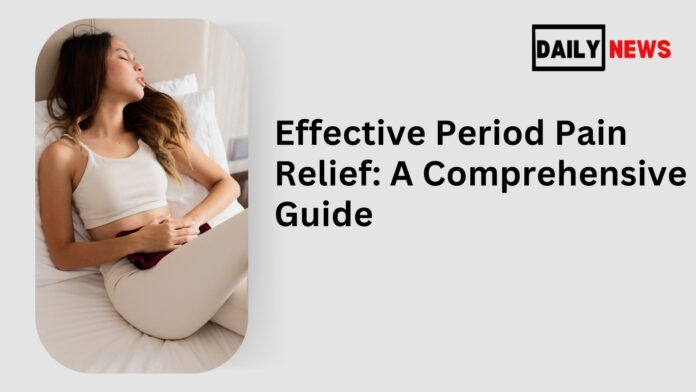Period pain, also known as dysmenorrhea, is a common issue that affects millions of women globally. While the intensity and duration vary, the discomfort can significantly impact daily life. We are here to provide a detailed and comprehensive guide to effective period pain relief that can help you manage your symptoms and regain control of your day.
Understanding Period Pain
Period pain is caused by the contraction of the uterus as it sheds its lining. The pain can range from mild to severe and is often accompanied by symptoms like nausea, fatigue, and headaches. Understanding the root cause of your period pain is crucial for finding the most effective relief strategies.
Home Remedies for Period Pain Relief
1. Heat Therapy
Applying heat to your lower abdomen is one of the simplest and most effective ways to alleviate period pain. Heat increases blood flow, which helps relax uterine muscles and reduce cramps.
- Hot Water Bottle or Heating Pad: Place it on your abdomen for 15-20 minutes.
- Warm Bath: Immersing yourself in a warm bath can provide full-body relief.
2. Gentle Exercise
While exercising during your period may seem counterintuitive, light activities such as stretching, yoga, or walking can significantly reduce pain.
- Yoga Poses for Cramps: Child’s pose, cat-cow stretch, and cobra pose can ease tension.
- Aerobic Activities: Increase endorphins, the body’s natural pain relievers.
3. Herbal Teas
Certain herbal teas can help relax muscles and reduce inflammation, providing natural relief from period pain.
- Chamomile Tea: Known for its anti-inflammatory properties.
- Ginger Tea: Reduces pain and nausea.
- Peppermint Tea: Relieves bloating and digestive discomfort.
4. Essential Oils
Massaging your abdomen with essential oils can be incredibly soothing. Some oils to consider include:
- Lavender Oil: Reduces pain and promotes relaxation.
- Eucalyptus Oil: Eases inflammation.
- Clary Sage Oil: Balances hormones and alleviates cramps.
Over-the-Counter Medications
For moderate to severe period pain, over-the-counter medications can provide quick relief.
1. Non-Steroidal Anti-Inflammatory Drugs (NSAIDs)
NSAIDs like ibuprofen and naproxen are highly effective in reducing inflammation and alleviating pain.
2. Pain Relief Patches
These patches deliver heat or medication directly to the affected area for targeted relief.
3. Supplements
Taking magnesium or vitamin B1 supplements regularly can help reduce the severity of cramps over time.
Lifestyle Changes for Long-Term Relief
Making specific lifestyle adjustments can help you manage period pain more effectively in the long run.
1. Balanced Diet
A nutrient-rich diet can help regulate hormones and reduce inflammation.
- Anti-inflammatory Foods: Include leafy greens, fatty fish, and nuts.
- Avoid Processed Foods: Minimize your intake of sugary and salty snacks.
2. Hydration
Drinking plenty of water can help reduce bloating, a common contributor to discomfort during menstruation.
3. Stress Management
Chronic stress can exacerbate period pain. Practice relaxation techniques such as meditation, deep breathing, or mindfulness.
When to See a Doctor
While period pain is common, severe or debilitating pain may be a sign of an underlying condition such as endometriosis or fibroids. Consult a healthcare professional if:
- Your pain is unmanageable with home remedies or medication.
- You experience symptoms like heavy bleeding or irregular cycles.
- The pain lasts longer than your usual cycle.
Alternative Therapies
For those seeking non-traditional methods of relief, several alternative therapies have shown promise.
1. Acupuncture
This ancient Chinese practice involves inserting fine needles into specific points on the body to alleviate pain and balance energy.
2. Chiropractic Care
Adjustments to the spine and pelvis may improve blood flow and reduce menstrual discomfort.
3. Aromatherapy
Inhaling calming scents like lavender or rose oil can help reduce stress and promote relaxation during your cycle.
Conclusion
Managing period pain doesn’t have to disrupt your life. By incorporating a mix of home remedies, over-the-counter medications, and lifestyle changes, you can find relief that works for you. Don’t hesitate to consult a healthcare professional for persistent or severe pain to explore additional treatment options.

Er. Rishav Raj (Btech Computer Science)
Dr. Rishav Raj (Bachelor of Ayurvedic medicine and Surgery)
I am a professional blogger since 12 years worked for different healthcare blog as well as health care advisor for different multinational companies as well as Software developer for different healthcare and technology based software.i am here to share you some informative blog regarding news , healthcare and technology







